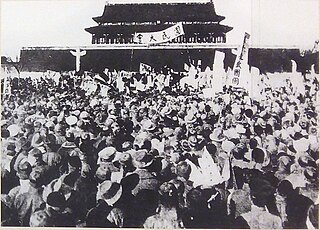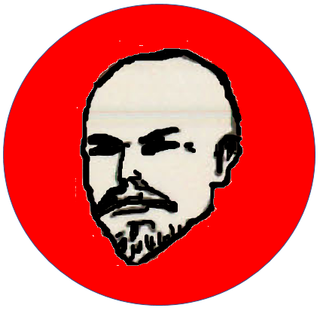
The Liberal Party was one of the two major political parties in the United Kingdom, along with the Conservative Party, in the 19th and early 20th centuries. Beginning as an alliance of Whigs, free trade–supporting Peelites, and reformist Radicals in the 1850s, by the end of the 19th century, it had formed four governments under William Ewart Gladstone. Despite being divided over the issue of Irish Home Rule, the party returned to government in 1905 and won a landslide victory in the 1906 general election. Under prime ministers Henry Campbell-Bannerman (1905–1908) and H. H. Asquith (1908–1916), the Liberal Party passed reforms that created a basic welfare state. Although Asquith was the party leader, its dominant figure was David Lloyd George.
Classical liberalism is a political tradition and a branch of liberalism that advocates free market and laissez-faire economics and civil liberties under the rule of law, with special emphasis on individual autonomy, limited government, economic freedom, political freedom and freedom of speech. Classical liberalism, contrary to progressive branches like social liberalism, looks more negatively on social policies, taxation and the state involvement in the lives of individuals, and it advocates deregulation.
Right-wing politics is the range of political ideologies that view certain social orders and hierarchies as inevitable, natural, normal, or desirable, typically supporting this position based on natural law, economics, authority, property, religion, or tradition. Hierarchy and inequality may be seen as natural results of traditional social differences or competition in market economies.

The May Fourth Movement was a Chinese cultural and anti-imperialist political movement which grew out of student protests in Beijing on May 4, 1919. Students gathered in front of Tiananmen to protest the Chinese government's weak response to the Treaty of Versailles decision to allow the Empire of Japan to retain territories in Shandong that had been surrendered by the German Empire after the Siege of Tsingtao in 1914. The demonstrations sparked nation-wide protests and spurred an upsurge in Chinese nationalism, a shift towards political mobilization away from cultural activities, and a move towards a populist base, away from traditional intellectual and political elites.

José Eloy Alfaro Delgado often referred to as "The Old Warrior," was an Ecuadorian politician who served as the President of Ecuador from 1895 to 1901 and from 1906 to 1911. Eloy Alfaro emerged as the leader of the Liberal Party and became a driving force for fairness, justice and liberty. He became one of the strongest opponents of the pro-Catholic conservative President Gabriel García Moreno (1821–1875). The "Viejo Luchador" played a central role in the Liberal Revolution of 1895 and fought against conservatism for almost 30 years.
The left–right political spectrum is a system of classifying political positions, ideologies and parties, with emphasis placed upon issues of social equality and social hierarchy. In addition to positions on the left and on the right, there are centrist and moderate positions, which are not strongly aligned with either end of the spectrum. It originated during the French Revolution based on the seating in the French National Assembly.

The historiography of the French Revolution stretches back over two hundred years.
The Radicals were a loose parliamentary political grouping in Great Britain and Ireland in the early to mid-19th century who drew on earlier ideas of radicalism and helped to transform the Whigs into the Liberal Party.
Anti-clericalism is opposition to religious authority, typically in social or political matters. Historically, anti-clericalism in Christian traditions has been opposed to the influence of Catholicism. Anti-clericalism is related to secularism, which seeks to separate the church from public and political life.

The Ecuadorian Radical Liberal Party was a liberal party in Ecuador. Prior to its dissolution in 2006, it was one of the oldest existing political parties in Ecuador.
This article gives an overview of political liberalism and radicalism in Ecuador. It is limited to liberal and radical parties with substantial support, mainly proven by having had representation in parliament. The sign ⇒ means a reference to another party in that scheme.

Whiggism or Whiggery is a political philosophy that grew out of the Parliamentarian faction in the Wars of the Three Kingdoms (1639–1653) and was concretely formulated by Lord Shaftesbury during the Stuart Restoration. The Whigs advocated the supremacy of Parliament, government centralization, and coercive Anglicisation through the educational system. They also staunchly opposed granting freedom of religion, civil rights, or voting rights to anyone who worshipped outside of the Established Churches of the realm. Eventually, the Whigs grudgingly conceded strictly limited religious toleration for Protestant dissenters, while continuing the religious persecution and disenfranchisement of Roman Catholics and Scottish Episcopalians. They were particularly determined to prevent the ascension of a Catholic heir presumptive to the British throne, especially of James II or his legitimate male descendants and instead granted the throne to the Protestant House of Hanover in 1714. Whig ideology is associated with early conservative liberalism.

Radicalism was a political movement representing the leftward flank of liberalism between the late 18th and early 20th century. Certain aspects of the movement were precursors to modern-day movements such as social liberalism, social democracy, civil libertarianism, and modern progressivism. This ideology is commonly referred to as "radicalism" but is sometimes referred to as radical liberalism, or classical radicalism, to distinguish it from radical politics. Its earliest beginnings are to be found during the English Civil War with the Levellers and later the Radical Whigs.

José María Plácido Caamaño y Gómez-Cornejo was an Ecuadorian diplomat and served as President of Ecuador 23 November 1883 to 1 July 1888.

The Brabant Revolution or Brabantine Revolution, sometimes referred to as the Belgian Revolution of 1789–1790 in older writing, was an armed insurrection that occurred in the Austrian Netherlands between October 1789 and December 1790. The revolution, which occurred at the same time as revolutions in France and Liège, led to the brief overthrow of Habsburg rule and the proclamation of a short-lived polity, the United Belgian States.

The revolutions of 1848, known in some countries as the springtime of the peoples or the springtime of nations, were a series of revolutions throughout Europe over the course of more than one year, from 1848 to 1849. It remains the most widespread revolutionary wave in European history to date.
Far-left politics, also known as extreme left politics or left-wing extremism, are politics further to the left on the left–right political spectrum than the standard political left. The term does not have a single, coherent definition; some scholars consider it to be the left of communist parties, while others broaden it to include the left of social democracy. In certain instances—especially in the news media—far left has been associated with some forms of authoritarianism, anarchism, communism, and Marxism, or are characterized as groups that advocate for revolutionary socialism and related communist ideologies, or anti-capitalism and anti-globalization. Far-left terrorism consists of extremist, militant, or insurgent groups that attempt to realize their ideals through political violence rather than using democratic processes.
Liberalism is a political and moral philosophy based on the rights of the individual, liberty, consent of the governed, political equality, the right to private property and equality before the law. Liberals espouse various and often mutually warring views depending on their understanding of these principles but generally support private property, market economies, individual rights, liberal democracy, secularism, rule of law, economic and political freedom, freedom of speech, freedom of the press, freedom of assembly, and freedom of religion. Liberalism is frequently cited as the dominant ideology of modern history.
The Conservative Party was an Ecuadorian conservative party formed in 1869. Initially associated with the military of Ecuador the PC became one of the two great parties of state in the country, alternating in power with the Ecuadorian Radical Liberal Party. Its traditional support basis has been amongst the landowning classes, as well as merchants and artisans and it tended to favour a unitary structure rather than federalism.
Liberalism, the belief in freedom, equality, democracy and human rights, is historically associated with thinkers such as John Locke and Montesquieu, and with constitutionally limiting the power of the monarch, affirming parliamentary supremacy, passing the Bill of Rights and establishing the principle of "consent of the governed". The 1776 Declaration of Independence of the United States founded the nascent republic on liberal principles without the encumbrance of hereditary aristocracy—the declaration stated that "all men are created equal and endowed by their creator with certain unalienable rights, among these life, liberty, and the pursuit of happiness". A few years later, the French Revolution overthrew the hereditary aristocracy, with the slogan "liberty, equality, fraternity" and was the first state in history to grant universal male suffrage. The Declaration of the Rights of Man and of the Citizen, first codified in 1789 in France, is a foundational document of both liberalism and human rights, itself based on the U.S. Declaration of Independence written in 1776. The intellectual progress of the Enlightenment, which questioned old traditions about societies and governments, eventually coalesced into powerful revolutionary movements that toppled what the French called the Ancien Régime, the belief in absolute monarchy and established religion, especially in Europe, Latin America and North America.











